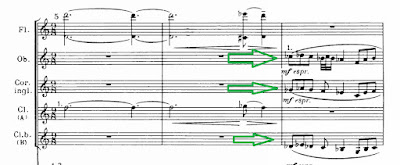CCXXXIV. BARTÓK, Béla (1881-1945)
Written to celebrate the 50th anniversary of the union of Buda and Pest, forming the Hungarian capital of Budapest.
**
Frequently programmed by orchestras today, the premiere was not too successful:
Frequently programmed by orchestras today, the premiere was not too successful:
"My Dance Suite was so badly performed that it could not achieve any significant success. In spite of its simplicity (!) there are a few difficult places, and our Philharmonic musicians were not sufficiently adult for them. Rehearsal time was, as usual, much too short, so the performance sounded like a sight-reading, and a poor one at that." -- Bartók
The movements are usually played without pause.
2. Allegro molto
3. Allegro vivace
4. Molto tranquillo
adding the oboe:
5. Comodo
6. Finale. Allegro
the dance figure in the clarinet:
then with thicker orchestration:
and ending with a bang:
**
The movements are usually played without pause.
1. Moderato
Although redolent of folksong material, the composition is pure Bartók. This movement is rather Arabic in character:
2. Allegro molto
A vigorous dance featuring pounding minor thirds and a sliding trombone part (red arrow):
3. Allegro vivace
With almost a bagpipe feel, the dance melody opens with a bassoon, a clarinet, and then full strings:
4. Molto tranquillo
Tightly-spaced whole tones give way to an eerie melody which Bartók gradually thickens, beginning first with English Horn and bass clarinet:
adding the oboe:
and finally the A clarinet. Bartók then reverses the whole thing.
5. Comodo
Under a pedal-tone E, this -- the shortest section -- features a quick descending chromatic motif which becomes thicker and leads to the final movement:
6. Finale. Allegro
A ferocious dance (same as Movement 3) begins with a piling up of Perfect Fourths in the strings:
the dance figure in the clarinet:
then with thicker orchestration:
and ending with a bang:
**
One can plainly observe the seeds of his Concerto for Orchestra (1945) [Post CV] in this earlier work.
















No comments:
Post a Comment